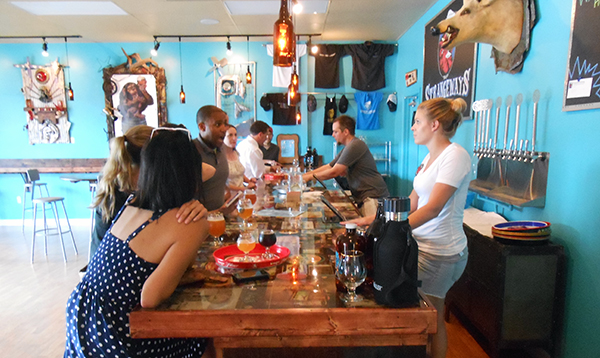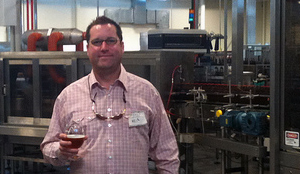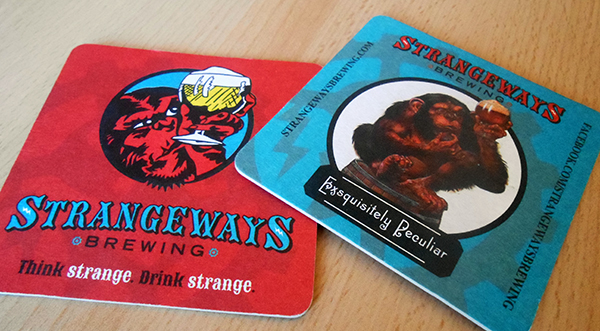The battle over a local beer brand has ended.
Henrico County’s Strangeways Brewing Co. and Massachusetts-based homebrew shop Strange Brew last week settled a trademark dispute that showed a rare sign of bitterness in an industry that promotes itself as a collegial band of brewers.
The fight, which centered on the “Strange Brew” trademark and a pending “Strangeways Brewing” trademark application, resulted in both sides filing lawsuits in federal court in attempt to do away with the other side’s brand name.
The terms of the settlement were not made public, but Hunton & Williams attorney Maya Eckstein, who represented Strangeways, said neither side gave up use of its brand.
“Customers will not see a single change,” she said. “Strangeways will still be Strangeways.”
Strangeways founder Neil Burton, who took his brewery’s name from an album by English rock band the Smiths, said he did not foresee a potential lawsuit as he researched the name before launching his brewery in spring 2013.
“I think people are getting a little too sensitive,” Burton said of the craft beer industry. “I realize this is a business, and I realize we’re all trying to run businesses here, but I think it is getting a little nitpicky at times.”
Burton’s dustup with Strange Brew began after he submitted an application to trademark “Strangeways Brewing” with the U.S. Patent and Trademark Office in 2012.
Strange Brew, which has held a trademark on its name since 2007, filed an opposition to Burton’s application. Its complaint called the Strangeways name “confusingly similar,” saying it would dilute the Strange Brew mark.
In July, Burton Brewing LLC, which operates Strangeways, landed a preemptive strike of sorts in federal court. It argued that “Strangeways Brewing” should be registered over Strange Brew’s objection.
It also alleged that the Strange Brew trademark, which is registered in the USPTO as both a beer product and a retail store selling beer and wine supplies, was fraudulently obtained and should be cancelled.
Strange Brew hit back in September with a response and a slate of counterclaims, including that Burton Brewing allegedly chose the Strangeways name with the intention of profiting from the reputation of the Strange Brew mark.
The federal court case was finally dismissed Jan. 9. Eckstein, who is also Burton’s wife, would not comment on the actual terms of the settlement. Local attorney Mark Schmidt of Ayers & Stolte, who represented Strange Brew and its founder Brian Powers, did not return a phone message seeking comment. Powers could not be reached.
ThompsonMcMullan attorney Zac Cohen, who last year formed a beverage practice group aimed at helping breweries face business hurdles, said parties in such cases tend to come to a co-existence agreement, which can dictate where and in what capacity the two parties may use their brands.
“The co-existence agreement would define their area of use, but I doubt there was any money exchanged,” he said.
As craft brewing continues to grow nationwide and more companies throw their brews, brands and marketing monikers into the mix, Cohen said some overlap in the industry is likely, even if not all similarly named beers take their cases to court.
“I think there is a little bit of a craft beer community feeling, if you will, because ‘we’re all against the big brewers,’” he said. “But I think, at the end of the day, a lot of times when you have so many entrants into the marketplace there are just inevitably going to be these conflicts.”
Burton proposed an alternate path toward resolving similar name conflicts in the brewing industry: picking up the phone. He recently noticed that Colorado-based Breckenridge Brewery had released “Ophelia Hoppy Wheat,” a seasonal beer that recently hit the Richmond market.
Strangeways also sells an “Ophelia” in its “Ophelia Wyrd Sisters Tripel” in bottles and on draft. Burton and Breckenridge’s Todd Usry came to a “gentleman’s agreement,” Burton said, that will keep both beers in Richmond and both brewers on the friendlier side of the bar.
“There’s ways that we can do this as a group of craft breweries that makes sense, and there’s some that cause a lot of frustration,” Burton said.
The battle over a local beer brand has ended.
Henrico County’s Strangeways Brewing Co. and Massachusetts-based homebrew shop Strange Brew last week settled a trademark dispute that showed a rare sign of bitterness in an industry that promotes itself as a collegial band of brewers.
The fight, which centered on the “Strange Brew” trademark and a pending “Strangeways Brewing” trademark application, resulted in both sides filing lawsuits in federal court in attempt to do away with the other side’s brand name.
The terms of the settlement were not made public, but Hunton & Williams attorney Maya Eckstein, who represented Strangeways, said neither side gave up use of its brand.
“Customers will not see a single change,” she said. “Strangeways will still be Strangeways.”
Strangeways founder Neil Burton, who took his brewery’s name from an album by English rock band the Smiths, said he did not foresee a potential lawsuit as he researched the name before launching his brewery in spring 2013.
“I think people are getting a little too sensitive,” Burton said of the craft beer industry. “I realize this is a business, and I realize we’re all trying to run businesses here, but I think it is getting a little nitpicky at times.”
Burton’s dustup with Strange Brew began after he submitted an application to trademark “Strangeways Brewing” with the U.S. Patent and Trademark Office in 2012.
Strange Brew, which has held a trademark on its name since 2007, filed an opposition to Burton’s application. Its complaint called the Strangeways name “confusingly similar,” saying it would dilute the Strange Brew mark.
In July, Burton Brewing LLC, which operates Strangeways, landed a preemptive strike of sorts in federal court. It argued that “Strangeways Brewing” should be registered over Strange Brew’s objection.
It also alleged that the Strange Brew trademark, which is registered in the USPTO as both a beer product and a retail store selling beer and wine supplies, was fraudulently obtained and should be cancelled.
Strange Brew hit back in September with a response and a slate of counterclaims, including that Burton Brewing allegedly chose the Strangeways name with the intention of profiting from the reputation of the Strange Brew mark.
The federal court case was finally dismissed Jan. 9. Eckstein, who is also Burton’s wife, would not comment on the actual terms of the settlement. Local attorney Mark Schmidt of Ayers & Stolte, who represented Strange Brew and its founder Brian Powers, did not return a phone message seeking comment. Powers could not be reached.
ThompsonMcMullan attorney Zac Cohen, who last year formed a beverage practice group aimed at helping breweries face business hurdles, said parties in such cases tend to come to a co-existence agreement, which can dictate where and in what capacity the two parties may use their brands.
“The co-existence agreement would define their area of use, but I doubt there was any money exchanged,” he said.
As craft brewing continues to grow nationwide and more companies throw their brews, brands and marketing monikers into the mix, Cohen said some overlap in the industry is likely, even if not all similarly named beers take their cases to court.
“I think there is a little bit of a craft beer community feeling, if you will, because ‘we’re all against the big brewers,’” he said. “But I think, at the end of the day, a lot of times when you have so many entrants into the marketplace there are just inevitably going to be these conflicts.”
Burton proposed an alternate path toward resolving similar name conflicts in the brewing industry: picking up the phone. He recently noticed that Colorado-based Breckenridge Brewery had released “Ophelia Hoppy Wheat,” a seasonal beer that recently hit the Richmond market.
Strangeways also sells an “Ophelia” in its “Ophelia Wyrd Sisters Tripel” in bottles and on draft. Burton and Breckenridge’s Todd Usry came to a “gentleman’s agreement,” Burton said, that will keep both beers in Richmond and both brewers on the friendlier side of the bar.
“There’s ways that we can do this as a group of craft breweries that makes sense, and there’s some that cause a lot of frustration,” Burton said.


